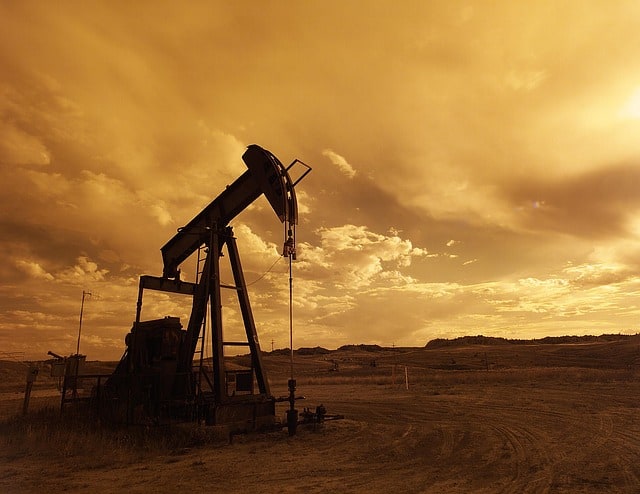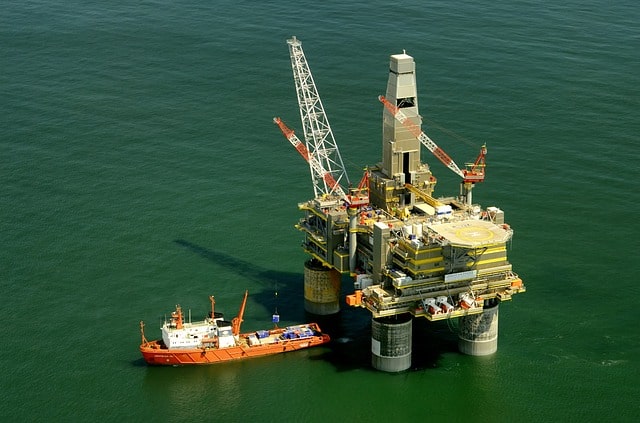Oil drilling is the process by which a pointed power tool is sunk into the ground in the hope of producing petroleum and at the same time inserting special mud. The power equipment allows portions of rocks and sections of gas to be transported back to the surface. The hole is normally 12 cm to 1 meter in diameter, after the hole has been drilled; parts of a steel pipe are placed into the hole.
Cement can be put between the surface and the exterior of the hole, also known as the annulus. The exterior is meant to give structural support to the new wellbore and also isolate potentially hazardous high-pressure zones from the surface and from each other. Afterward, drilling can go deeper probably to more unbalanced and aggressive configurations.
The process is made possible by a drilling rig that has all the required equipment for circulation of the drilling fluid, hoisting and turning the pipe, controlling downhole, removing cuttings from the drilling fluid, and generating on-site power for the processes.
Let’s have a look at the various aftereffects of oil drilling on the ocean and the environment.
What Effect Does Oil Drilling Have on the Ocean?
1. Spills cause the most damage
Oil spills have huge financial effects; they interrupt transportation and injure inhabitants such as the 2010 Gulf of Mexico blowup. Such oil spills are likely where companies drill for oil offshore.
The accidents also end up negatively affecting coral reefs and aquatic life. When birds and other sea creatures get oiled, they lose their potential of hunting for food for their survival. Spills also expose individuals to seafood that is not safe for consumption.
2. Unwanted sonic turbulences
Offshore searching teams mostly use air guns to send sound signals into water bodies; the sound then bounces off the ocean bed enabling the groups to establish maps that can discover underwater oil potential areas.
Since fish like a dolphin and other aquatic animals use sound to search for food, communication and traveling, the loud sound waves can interrupt their daily lives. Seismic studies tend to cover up to 600 miles and go for almost a month.
3. Safe waste disposal
Offshore drilling generates waste substances like bilge water and chemical by-products. Some of these wastes may get into the ocean. The United States Environmental Protection Agency (EPA) controls such wastes by ensuring the oil drilling companies send the waste materials to dispose them at the shore, alternatively, they treat the waste products before releasing them back into the ocean. On occasions, however, the industries release the waste substances minus treating them.
4. Effects on the ocean floor
Offshore drilling physically interrupts the seabed environment and the benthic group. From the actual trail of the drilling rig, the underwater pipelines, searching ship channels, and the cuttings and other debris from drilling, there are a lot of elements of drilling that leave a long-lasting effect on the seafloor.
This is imperative to note, mainly when bearing in mind that a lot of the universe’s most susceptible ocean floor habitations are also great resources for oil and gas, such as the Great Barrier Reef, the Gulf of Mexico and arctic are all exceedingly diverse ecological units with considerable oil and gas deposits. Some professionals believe that oil rig platforms are excellent homes for fish.
Environmental Impact of Oil and Gas Drilling
1. Emissions to the air
In countries such as Norway, oil, and gas industries are the main source of greenhouse gas emissions. It also produces volatile organic compounds (VOCs), and when combined with NOx; they contribute to the forming of ground-level ozone.
Producing oil and gas needs a great quantity of energy, drilling of boreholes, treating the oil and extracting the gas, which requires the use of gas turbines and diesel engines so as to produce the energy needed.
Transportation of the products from the drilling sites to the land terminals needs huge quantities of energy as well. Offshore loading greatly contributes to the emitting of VOCs, particularly while using tankers. Additionally, the burning of gas produces soot and particles.
2. Burning of gas and light pollution interrupt beautiful views and clear skies
Even in regions that do not have distinct cultural importance, the goings-on of oil and gas generation and boreholes destroy special picturesque values. Especially all along main travel roads or exceptionally beautiful community lands, the existence of oil or gas boreholes is overwhelming. The glare of the oil and gas boom in the United States can be seen from space, according to NASA.
3. Concerns about human safety
The possibility of getting injured and succumbing to death is always there while drilling for oil. For instance, some team members died during the incident of the Gulf of Mexico in 2010, another drilling incident happened in 1982 when the largest drilling rig at the time sank because of a storm causing all the crew members, 84 in total to lose their lives.
Even though through the years technology has greatly improved, offshore drilling, particularly in icy regions remains deadly.
4. Unsafe methane emissions contribute to the modification of the environment
The oil and gas extraction also emits Methane which is the main constituent in natural gas. The gas is more damaging to the environment than carbon dioxide, locking in heat more efficiently and escalating global warming.
Avoidable seeping out and flawed infrastructure in natural gas manufacturing are so frequent that they considerably add to methane pollution in and around the regions.
In the most recent years, a noxious methane plume the size of Delaware was found floating around New Mexico. Oil and gas companies also time and again intentionally release methane into the atmosphere through emitting, the restricted discharge of natural gas, and burning some of it in the air.
The government did not succeed in taking to pieces contamination regulations that aid in stopping natural gas waste and methane pollution, one of the battles against Trump administration in aiding the protection of public health and the surroundings from dirty fossil fuel growth.
5. Disrupting wildlife migration paths and habituations from noise pollution, congestion, and barriers
Ecological systems are extremely intricate and can be a casualty to severe environmental penalties when disrupted by human activities. An increase in vehicle congestion at oil drilling regions contributes considerably to noise pollution in the habitats of animals. Wild animals tend to act in response to noise turbulences with evasion actions, but research has come to prove that such actions eventually become habitual.
Negative effects include disruption of communication between songbirds during procreation and nesting times, they also change the predator and prey system. Animals that have adapted to traffic have high probabilities of getting killed on roads.
6. Oil and gas transportation and traffic ruin serene settings for tourists
Tourism and out-of-doors recreation are big economic propellers for most countries. However, oil tanks network roads and loud compressors devalue picturesque values and essential sources of income for the public.
A lot of noise pollution near a fishing ground, a decrease in the number of fascinating species of birds or extreme weedy plants may cause a reduction in the contentment with the outside recreation and tourism. Thus, the reduction of tourism activities because of the impacts of oil and gas can reduce the economic development of a country.
7. Scenery modifications from well pads and roads
The activities from oil and gas drilling construction activities leave behind deep-seated effects on the scenery. The companies require well pad and construction of roads, the process uses weighty machines such as bulldozers, gravel trucks, etc.
The processes end up stripping the environment of plant life, amplify soil erosion which may cause flooding and landslides, disturbing the surface of the earth, severely spoiling habitations of animals, in most cases, such effects cannot be reversed.
8. Climate change
The burning of petroleum leads to a rise in the quantity of carbon dioxide emissions and other greenhouse gases. Studies show that a rise in carbon dioxide causes an increase in atmospheric heat. The burning of petroleum for transport purposes, domestic and industrial uses are one of the major causes of air pollution. The eventual spin-off of combusting oil is carbon dioxide; nevertheless, there are other by-products like nitrates and carbon dioxide.
The by-products react with the environment producing ozone and other greenhouse gases. The negative effects as a result of an increase in air pollution cause a rise in temperatures.
The atmosphere returns 30% of the arriving radiation waves and remains with 70% for warmth. Nonetheless, a rise in the amount of carbon dioxide in the atmosphere operates as a “blanket” to the increased heat.
As a result, the longer wave radiation gets entrapped in the ambiance where there is already a high concentration of carbon dioxide causing a further increase in temperatures. This will lead to global warming which consists of changes in rainfall patterns, melting of glaciers, and changes in sea levels.
8. Waste oil
Not only does waste oil contain a breakdown of products but also contaminated impurities from usage. Instances of such oils include hydraulic oil, brake fluids just to mention a few.
A lot of the problems that are connected with the extracted petroleum are also associated with waste oil ends up traveling into water channels. The oil becomes toxic to both the soil and water for consumption. Rainfall also moves the waste oil to larger water bodies thus contaminating them too.
References:







